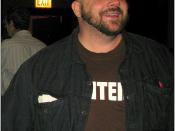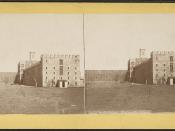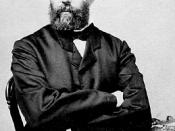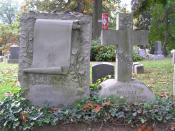"The Dry Cistern" From 1870 to 1900, the United States became the world's foremost industrial nation. Overall, the nation experienced a stunning explosion in the scale of industry and in the pace of production. By the turn of the century, industrialization had transformed commerce, business organization, the environment, the workplace, the home, and everyday life. Herman Melville depicts the mechanization, dehumanization, and repetition of employment in Industrial America in his short story, "Bartleby the Scrivener: A Story of Wall Street." The personality of the characters, the description of the type of labor performed, and the use of walls within the setting display the removal of humanity from the workplace during this era.
More than three-quarters of the labor force worked in agriculture in 1790. During the nineteenth century, however, Americans soon enjoyed striking "success" in mechanization. Melville's description of the labor performed at the office that employed Nippers, Turkey, and Bartleby were employed displays the autonomy and monotony of employment during the Industrial Era.
The rather erratic nature of Nippers and Turkey, whose "...fits relieved each other like guards" puts forth the ideal of consistency. Nippers and Turkey lived lives outside their monotonous jobs. Both men drank, which revealed a certain level of discontent. Alcohol served as an escape. The narrator mentioned that he "always deemed him (Nippers) the victim of two evil powers- ambition and indigestion." Nippers' ambition granted him activities outside of copying; he "occasionally did a little business at the Justices' courts." Notice that the narrator deemed ambition as evil. Furthermore, Nippers' indigestion is linked to "a continual discontent with the height of the table where he worked." This discontent of "not knowing what he wanted" is also considered evil. Turkey's downfall was his energetic emotion. In the morning Turkey sported "a fine florid hue" until after dinner when he "blazed like a grate full of Christmas coals." However, both Turkey and Nippers carried on with "regularity and undiminished glory." They were isolated from the boss and from Bartleby. The two men completed each other; one dressed well, the other did not, when one was "on" the other was "off." Neither could be deemed a man, but rather, half of a man; without one another, they would not have been able to function. Neither man was fully or completely involved in his job. Conversely, there was the isolated Bartleby.
At first Bartleby did "an extraordinary quantity of writing⦠he ran a day and night line, copying by sun-light and by candle-light⦠he wrote on silently, palely, mechanically." The narrator was very content with his perfunctory work ethic. The narrator referred to him as a mule rather than an employee. For example, he said, "â¦Surely you do not mean to persist in that mulish vagary?" However, isn't the work that the narrator expected of Bartleby mulish? Eventually, Bartleby burned out, much like the candle he worked by at night. No human can forgo outside contact and still manage to grasp sanity. Bartleby was different in other ways also; he expressed his preferences rather than assumptions and refusals. The boss described himself as "a man of assumptions." Turkey and Nippers blatantly refused to work during their "off" hours. Bartleby's polar different reply, "I would prefer not to," and outlook on work was a curveball that the narrator was not prepared for. This line was repeated monotonously, as a mirror to the work that was performed in the office. The line affected the narrator like the work performed affected the employees: it drove him crazy. "I would prefer not to," stirred anger and discontent because the narrator could not reach its meaning. It was not a fulfilling reason.
Melville illustrated the increasing hopelessness and futility of individuality in the workplace though vivid imagery. "My chambers were upstairs at No. ____ Wall Street," gave the story ambiguity: this could have taken place in any or every office on Wall Street. The narrator meticulously described the setting of his office: At one end they looked upon the white wall of the interior of a spacious skylight shaft, penetrating the building from top to bottom. This view might have been considered rather tame than otherwise, deficient in what landscape painters call "life."⦠In that direction my windows commanded an unobstructed view of a lofty brick wall, black by age and everlasting shade; which wall required no spy-glass to bring out its lurking beauties, but for the benefit of all near-sighted specters, was pushed up to within ten feet of my window panes... Owing to the great height of the surrounding buildings, and my chambers being on the second floor, the interval between this wall and mine not a little resembled a huge square cistern.
The narrator mentioned the view was, "deficient in what landscape painters call 'life.'" The air of death in the narrator's chambers was more than just a matter of pure setting. The opposing view of the "lofty brick wall, black by age and everlasting shade," offered no view of life either. The views are equally depressing. To worsen the situation, the wall was only ten feet from the narrator's window, which created a prison like hermitage. The great height of skyscrapers is usually associated with unlimited success and possibilities; however, here they draw away from the outdoors, freedom, and life. The imagery of the office illustrates that the nature of the scrivener's work is like a brick wall; it is meaningless. The narrator compared the interval between the walls to a "huge square cistern." A cistern is an artificial reservoir for storing liquids and especially water. Water is the image of life. It is only appropriate that the "cistern" created by the walls was dry.
To emphasize the defined role of boss and employee, the narrator separated himself from his colleagues. The narrator noted, "â¦glass folding-doors divided my premises into two parts, one of which was occupied by my scriveners, and the other by myself." This statement represents the white-collar workforce. Upper-management is separated from the "laborers." Separation creates inferiority on the part of the "laborers" and defines divisions of rank and power. Bartleby is assigned "a corner by the folding doors, but on my side of them, so to have this quiet man within easy call, in case any trifling thing was to be done." The narrator's comment illustrated how upper-management uses employees without respect to humanity. He placed Bartleby on his side and surrounded him with the folding doors to isolate him from Nippers and Turkey as well as from himself. Bartleby's desk was "close up to a small side-window in that part of the room, a window which originally had afforded a lateral view of certain grimy back-yards and bricks⦠but which now commanded⦠no view at all, though it gave some light." The walls of work imprisoned Bartleby so that he was not able to see life in or outside the office. The narrator continued the description with, "Within three feet of the panes was a wall, and the light came down from far above, between two lofty buildingsâ¦" Earlier in the story, the wall was described as, "within ten feet of my window panes." This evokes a sense of shrinking tolerance for individualism. Bartleby was more isolated, confined, and imprisoned than the narrator. The brick wall was a barrier that afforded no opportunity for advancement, creativity, or enjoyment.
In addition to the already dramatic isolation, the narrator stated, "Still further to a satisfactory arrangement, I procured a high green folding screen, which might entirely isolate Bartleby from my sight, though not remove him from my voice." This was done out of pure selfishness. How can anyone declare this a "satisfactory arrangement"? Green is a natural color associated with the outdoors, but here it is the source of unnatural isolation. Does the narrator think that Bartleby can be tricked into feeling comfortable and natural in his enviroment? The narrator was separated from Nippers and Turkey by a glass door. He was still connected to them visually. However, Bartleby was entirely isolated from his sight. The narrator attempted to turn Bartleby into a machine that could be packed up and stored away until needed (which is an unfeasible task to accomplish). Bartleby lost his livelihood quickly. The narrator noted, "â¦I noticed Bartleby did nothing but stand at his window in his dead-wall reverie." The narrator assumed that the "dull and glazed" look in Bartleby's eyes was a physical ailment. After all, how could a machine suffer mental anguish? Bartleby didn't leave the office when the narrator encouraged him to do so. Rather, he "remained, as ever, a fixture in my chamber." As Bartleby's actions changed, the narrator's references to Bartleby changed; Bartleby went from being the "living dead" to a "ghost." When Bartleby preferred not to leave the office, the narrator decided, "If he will not quit me I will quit him." His escape was unsuccessful, however, and the new tenant called to inform the narrator, "He now persists in haunting the building generally, sitting upon the banisters of the stairs by day, and sleeping in the entry by night." Bartleby was a constant reminder of the effects of the mechanization, dehumanization, and repetition. He was worse than a brick wall. He was the loss of humanity. The walls that formed the hallway where Bartleby resided after the narrator moved illustrates just how narrow Bartleby's path became. The walls closed in so far that he could no longer inhabit what could be qualified as a room. His options narrowed, as did his surroundings. The end was near.
The high walls "of amazing thickness" of the Tombs served as the final barrier image. A tomb is commonly defined as a "place of interment." The name of the prison is a key to the end of the story; it foreshadowed Bartleby's death. However, the symbol of the prison walls was complicated by the appearance of green grass and by the lawyer's exclamation in regard to the prison atmosphere, "There is the sky, and here is the grass." Prison offered Bartleby a taste of life, more so than he was allotted in the office on Wall Street. The food at the prison symbolizes life; he refused to engorge himself on this offering of life. Melville's statement is that "sometimes there is no turning back." Bartleby's spirit was dead; there was no way to save him. When something wastes away to the point of "no return," it cannot be fixed. There must be a complete renewal: a rebirth. Bartleby's position in death revealed such a conjecture.
Strangely huddled at the base of the wall- his knees drawn up, and lying on his side, his head touching the cold stones- I saw the wasted Bartleby.
Bartleby assumed the fetal position. This image suggested a passive retreat to the womb: the death of Bartleby, but also the rebirth. Perhaps his next life will truly be a life.
During the time period in which Bartleby the Scrivener, set roughly in the mid nineteenth century, takes place, intense changes were happening in the American economic and social sphere. The introduction of the industrial age solved this problem. However, Bartleby the Scrivener illustrates how industrialization negatively transformed the quality of life at the workplace; Melville attacked the emerging problems of this new working atmosphere, mainly monotony, boredom, and alienation. Is efficiency in the workplace worth the loss of humanity, autonomy, and the gain of monotony?





